外研版(三起)-英语-五年级上册-Unit 2 Yesterday I went to Sam and Amy's school教案
外研版小学英语(三起)五年级上册Module2Unit2基础知识解析

外研版小学英语(三起)五年级上册Module2Unit2基础知识解析Module2Unit2基础知识解析2.Listen and read.听一听,读一读。
Lingling :We need a big bag for our picnic.我们需要为我们的野餐准备一个大包。
Amy:We can use the bag over there.我们可以用那边的包。
Lingling:How much cheese did you buy?你们买了多少奶酪? Amy:Half a kilo.And we also bought a lot of chocolate!Lingling:How much chocolate did you buy?你们买了多少巧克力? Sam:Half a kilo!We can eat some now!半千克/半公斤。
我们现在可以吃一些(巧克力)!3.Point and say.指一指,说一说。
Boy:How much milk did you buy?你买了多少牛奶? Girl:Six bottles.六瓶。
Boy:How many apples did you buy?你买了多少个苹果? Girl:Four.四个。
How many do you want? 你想要多少? How many apples?多少个苹果? How many pears?多少个梨?How many do you want?你想要多少?A kilo or two,a kilo or two?一千克还是两千克,一千克还是两千克? Here ’s a big bag for you.How much milk?多少牛奶? How much juice?多少果汁?How much do you want?你想要多少?A bottle or two,a bottle or two?一瓶还是两瓶,一瓶还是两瓶?6.Do and say.做一做,说一说。
外研版(三起)-英语-五年级上册-英语外研版五年级上 Unit 2 教材同步讲解 教案

Module 10Unit 2 Don’t shout,please!请不要大叫!Look and write.Then say.看一看,写一写,然后说一说。
(教材第60页) 课文全译Don’t climb the tree! 不要爬树!活动指导1.活动类型:信息交流活动;个体单独活动。
2.活动目的:学会在自然的情景中运用否定祈使句描述某些行为规范。
3.参考词汇:climb the tree,walk on the grass,shout,feed the fish。
4.注意事项:书写前要仔细观察图片,书写时句首单词的首字母要大写,句尾要加标点符号。
Listen and repeat.听一听并重复。
(教材第60页)课文全译m n ng l w ymum 妈妈new新的sing唱歌lion狮子warm温暖的yes是的jump 跳fan风扇swimming游泳ruler直尺window窗户year年知识详解拓展点1.字母m,n,l,w,y和字母组合ng在单词中的发音字母(组合)发音发音要领口型示范m/m//m/是浊辅音,发音时声带振动。
双唇紧闭,舌平放,让气流经过鼻腔,从鼻孔泄出。
发音完毕,双唇仍保持紧闭状态。
属鼻辅音。
n/n//n/是浊辅音,发音时声带振动。
舌尖紧贴上齿龈,让气流经过鼻腔,从鼻孔泄出。
发音时双唇始终微微张开。
属鼻辅音。
ng/ŋ//ŋ/是浊辅音,发音时声带振动。
舌后部高高抬起,抵住下垂软腭,让气流经过鼻腔,从鼻孔泄出。
发音时双唇始终微微张开。
比/n/音有更浓重的鼻音。
l/1//1/是浊辅音,发音时声带振动。
舌身向上弓起,舌尖紧贴上齿龈,让气流从舌的两侧通过。
属舌侧音。
w/w//w/是浊辅音,发音时声带振动。
舌后部向软腭抬起。
双唇突出,并呈小圆口形。
发音瞬间即滑向后面的元音。
又称半元音。
y/j//j/是浊辅音,发音时声带振动。
舌前部向上腭抬起。
双唇呈扁平口形。
发音瞬间即滑向后面的元音。
外研版(三起)-英语-五年级上册- Module 8 Unit 2 教材同步讲解 教案(句型)
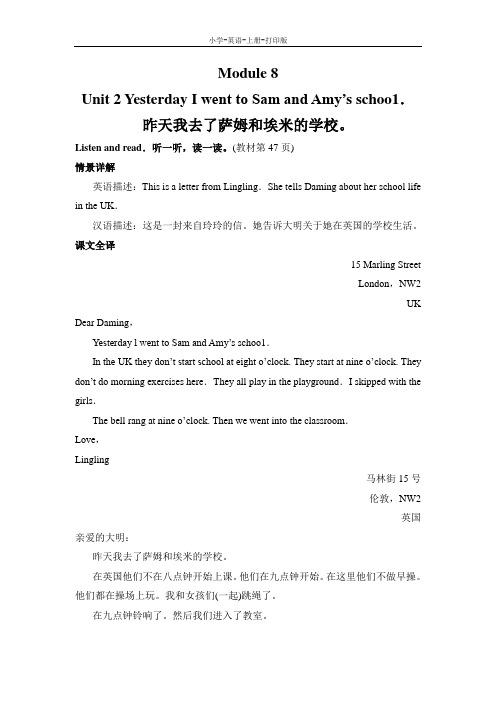
Module 8Unit 2 Yesterday I went to Sam and Amy’s schoo1.昨天我去了萨姆和埃米的学校。
Listen and read.听一听,读一读。
(教材第47页)情景详解英语描述:This is a letter from Lingling.She tells Daming about her school life in the UK.汉语描述:这是一封来自玲玲的信。
她告诉大明关于她在英国的学校生活。
课文全译15 Marling StreetLondon,NW2UK Dear Daming,Yesterday l went to Sam and Amy’s schoo1.In the UK they don’t start school at eight o’clock. They start at nine o’clock. They don’t d o morning exercises here.They all play in the playground.I skipped with the girls.The bell rang at nine o’clock. Then we went into the classroom.Love,Lingling马林街15号伦敦,NW2英国亲爱的大明:昨天我去了萨姆和埃米的学校。
在英国他们不在八点钟开始上课。
他们在九点钟开始。
在这里他们不做早操。
他们都在操场上玩。
我和女孩们(一起)跳绳了。
在九点钟铃响了。
然后我们进入了教室。
爱你的玲玲知识详解拓展点1.名词所有格课文应用:Yesterday l went to Sam and Amy,:schoo1.昨天我去了萨姆和埃米的学校。
名词所有格表示所属关系,一般情况下在名词词尾加“’s”。
课文中的“Sam and Amy’s”就是名词所有格形式,只在最后一个名词Amy的后面加“’s”,表示是他们共有的学校;如果表示两者各自拥有,就在两个名词后面分别加“’s”。
(三起)外研版五年级英语上册 Module 2 Unit 2同步习题

外研五英上Module 2 Unit 2同步习题一、按要求写单词。
1. kilo (复数)______2. eat (过去式)______3. drink(过去式)____4. big(反义词)______5.it (复数)_______二、用所给单词的适当形式填空。
1. _____ you ____ (eat) the chocolate yesterday?2. We can____ (use) the bag.3. Yesterday we _____ (buy) a bag of chocolate.4. How much____ (cheese) did you buy?5. The nice bag is_____ (I).三、单项选择。
( )1. How much_____ did you eat?A. applesB. cheeseC. pear( )2. Did you ______ any chocolate?A.boughtB. buysC. buy( ) 3. The cheese_____ very nice.A. isB. amC. are( ) 4. --______ is the skirt? --Ten dollars.A.How manyB. How muchC. How( ) 5. We bought two ____ of water.A.bottleB. bottlesC. cup三、给下列句子找出适当的答语。
( ) 1. How many apples did you buy? A. On foot.( ) 2. Did you buy any milk? B. I bought ten.( ) 3. How much water did you drink? C. Yes. I bought some..( ) 4. Did you buy any cheese yesterday? D. I drink a bottle of water.( ) 5. How did you go to the supermarket? E. No, I bought some bread.四、根据句意,选词填空。
外研版(三起)五年级英语上册第二模块测试题及答案

Module 2 Unit 1 同步练习( 五年级)一、单项选择(15)( ) 1 Will you help_____ ? A he B him C his( ) 2 How many _____ do you want ? A apple B apples C an apple( ) 3 How _____milk do you want ? A many B much C few( ) 4 How much is it going _____ ? A to cost B cost C costs( ) 5 How many things are there _____ the list ? A in B at C on( ) 6 I want to buy a _____ . A hamburger B cheese C hamburgers( ) 7 What about a _____ ? A dog B apple C oranges( ) 8 His birthday is on Sunday . I want to buy _____a present . A her B him C he( ) 9 Let’s go to the _____. We need food for our picnic . A supermarket B hospital C cinema ( ) 10 Amy and Sam like _____. A banana B bananas C cat( ) 11 Here _____ your oranges . A is B am C are( ) 12 Hello. How _____ oranges do you want ? A many B long C much( ) 13 What about some pears ?_____. A Yes, I do . B Yes, I like pears. C Yes, it is . ( ) 14 Do you like _____, Lingling ? A cheeses B cheese C chees( ) 15 Let’s buy one kilo of ____. A noodle B noodles C the noodles二、连线(9)1 How much cheese do you want ? A They will come tomorrow.2 How many things are there ? B I’m shopping .3 When will these things come ? C Half a kilo.4 What are you doing ? D Thirty-seven.1 How much do you need ? A 让我们列个清单吧!2 Let’s make a list. B 你想要多少果汁?3 How much juice do you want ? C 让我们去购物吧!4 Let’s go shopping. D 你能看见多少只鸭子?5 How many ducks can you see ? E 你需要多少?三、选词填空(5)1 They are ________________ school.2 Do you live ______________ China ?3 We need some food _____________our picnic .4 I want half a kilo _____________noodles .5 Let’s go ____________ the supermarket.四、补全对话(16)A: Let’s go to the ____________________, Lingling. We need food for our picnic.Can you read the shopping ________________to me , please?B: The first thing is bananas. How _________________ do you want ?A: Six , please. Amy and Sam like bananas. Do you like _______________________?B: Yes , I do .A: Good. What’s ____________________ ?B: _______________________. I can see the cheese . How ___________________cheese do you want ?A: Half a __________________. Do you like cheese , Lingling ?B: Great !五、选词填空(5)1 How ______________( much / many ) bananas do you want ?2 Here’re ___________________( you / your ) pears.3 Can you ___________________( need / read ) the list for the old man ?4 Amy and Linda ____________________( like / likes ) milk. 5. (Do/Are)you like bananas?Module 2 Unit 2 同步练习( 五年级)一、选择(10)( ) 1 There are ____ books on the desk . A many B much C any( ) 2 Do you have bags ? No, I don’t . But I have six _____. A box B boxes C boxs( ) 3 ____ there much milk in the glass ? Yes, there is . A Is B Are C Am( ) 4 What are we going to take ____our picnic?. A in B on C at( ) 5 What about ____ ? A play football B playing football C play the football( ) 6 How much milk do you want ? ____ . A Six bottles , please . B Five apples . C Ten oranges . ( ) 7 How many apples do you want ? ____ . A Here you are . B Seven oranges . C One kilo , please. ( ) 8 Do you like cheese ? ____. A Five yuan, please. B No , I don’t . C Yes, I am .( ) 9 Does John like bananas ? ____. A Yes , he does. B No , he is . C Yes , he doesn’t.( ) 10 What did you do yesterday ? ____. A I am doing my homework. B I played basketball . C I am a pupil.二、选词填空(14)1 _____________________ cakes do you want ? Five cakes, please.2 _____________________ cheese do you want ? A kilo.3 _____________________ books are there ? Twenty-eight.4 _____________________ is it going to cost ? One hundred yuan .1 ____________________apples do you want ? Two kilo , please.2 Let’s go _______________the supermarket.3 _____________ you like bananas ? Yes , I do .4 ______________________ cheese do you want ? Half a kilo.5 Did you have ______________ ice cream yesterday ?6 What’s ________________ ? Cheese .7 Did you go home _________________bus yesterday ?8 We need food __________________our picnic .9 What are you going to take __________________ our picnic ?10 Let’s buy one kilo ________________noodles .三、改错(10)1 Let buy one kilo of noodles . →2 We need food to our picnic . →3 How many orange do you want ? →4 Here’re you oranges . →5 Do you like milks ? →四、连词成句(10)1 much do how need you _______________________________________________________________2 are you what take going to ___________________________________________________________3 go home going to I am ____________________________________________________________4 us let make a list ____________________________________________________________________5 want I bottles five of milk _____________________________________________________________五、根据汉语提示补全句子(6)1 I ________________________(喜欢)noodles very much .2 _________________________(让我们)make a list .3.Did Lily _____________________(落下,掉下) her ice cream yesterday ?Module 2 Unit 1 基础篇( 五年级)一、单词(10)1 超市__________________2 需要____________3 食物____________4 野餐_____________5 下一个____________6 奶酪_____________7 一半儿___________8公斤_____________9果汁______________10盒子______________二、词组(20)1 去超市_______________________2 购物清单______________________3 多少(用于可数名词)________________ 4多少(用于不可数名词)___________________5半公斤____________________6 一公斤面条___________________ 7制作一个清单_________________________8…怎么样_____________________三、选择(10)( ) 1 We need food ___ our picnic . A to B on C of D for( ) 2 Can you read the shopping list ___ me ? A to B on C of D for( ) 3 ______ books do you want ? A How many B How much C how many D how much( ) 4 Amy and Sam ____ bananas . A like B likes C liked D doesn’t like( ) 5 ______ cheese do you want ? A How many B How much C how many D how much( ) 6 Let’s buy one kilo ____ noodles . A to B on C of D for( ) 7 What are we going to take ____ our picnic ? A to B on C of D for( ) 8 Let’s ___ a list . A make B makes C making D made( ) 9 How much do we need ? Six ____ . A box B boxes C boxs D boxing( ) 10 How much ____ do you want ? A books B apples C milk D oranges四、用所给动词的适当形式填空(10)1 Do you _____________ ( like ) oranges ? Yes , I do .2 How much cheese _____________( do ) you want ? One kilo, please .3 We ________________ ( go ) to the park yesterday .4 Look , they are _________________ ( play ) basketball .5 Is she ___________________ ( listen ) to music ? Yes, she is .6 I ___________________( buy ) a new book yesterday .7 They ________________ ( go ) to school by bike yesterday .8 My father __________________(come ) back last Sunday .9 Does your grandma _________________( live ) in London ? No , she doesn’t .10 Yesterday, I ___________________( have ) an ice cream .五、连词成句(10 )1 oranges you how many do want ________________________________________________________2 like you do apples _____________________________________________________________________3 saw I bus a yesterday _________________________________________________________________4 can I the see cheese __________________________________________________________________5 are back China you from _______________________________________________________________六、句型转换(10)1 Did you go to work yesterday ?(做出肯定回答)__________________________________________________________2 They went home by bus yesterday .(对划线部分提问)_____________________________________________________3 How many apples do you want ?(用two kilos 做回答)____________________________________________________4 Do you like noodles ?(做出否定回答)__________________________________________________________________5 They are watching TV .(对划线部分提问)_______________________________________________________________七、名词变复数(30)1 box __________2 bus _________3 watch __________4 brush __________5 orange __________6 page ____________7 hero_________8 kilo _________9 tomato ________10 hippo(河马) ________11 baby ________12 family _______13 key _______ 14 boy _______ 15 zoo _______ 16 radio ________ 17 leaf ________ 18 knife _________19 man ______ 20 woman ________21 sheep ________22 tooth ________23 foot _______ 24 mouse _________ 25 ox (公牛)________ 26 child _________ 27 Chinese ____________ 28 Japanese ______________ 29 postcard____________30 hobby_______ 参考答案:Module2 Unit1同步练习:一、BBBAC AABAB CABBB 二、1C 2D 3A 4B 1E 2A 3B 4C 5D 三、1at 2 in 3 for 4 of 5 to 四、supermarket ,list,many, bananas,next, cheese,kilo. 五、many,your,read,like,DoModule2 Unit2同步练习:一、ABABB ACBAB 二、1.How many,2.How much.3.How many. 4.How much. 1.How many,2.to,3Do,4.How much,5.an,6.next,7.by,8.for,9.on, 10.of 三、1.Let---Let`s 2.to---for 3.orange---oranges 4.you---your ks--milk 四、1.How much do you need?2.What are you going to take? 3.I am going to go home. 4. Let us make a list.5.I want five bottles of milk. 五、1.like 2 Let`s 3.dropModule2 Unit1基础篇:一、1.supermarket 2.need 3.food 4. Picnic 5.next 6.cheese 7.half 8.kilo 9.juice 10.box 二、1.go to the supermarket 2.the shopping list 3.how many 4.how much 5.half a kilo6.a kilo of noodles 7.make a list 8. What about....? 三、DAAAB CB ABC 四、1.like 2.do 3.went 4.playing 5.listening 6.bought 7. Went 8. Came 9.live 10.had 五、1.How many oranges do you want? 2.Do you like apples? 3.I saw a bus yesterday.4, I can see the cheese.5.You are back from China.六、1.Yes,I did.2.How did they go home yesterday?3.Two kilos of apples 4.No,I don`t. 5.What are they doing?七、boxes,buses,watches,brushes,oranges,pages,heroes, kilos,tomatoes,hippos ,babies,families,keys,boys,zoos,radios, leaves,knives,men,women,sheep,teeth,feet,mice, oxen, children,Chinese, Japanese, postcards,hobbies.。
外研版(三起点)小学五年级英语上册Module1_Unit2_精讲精练课件
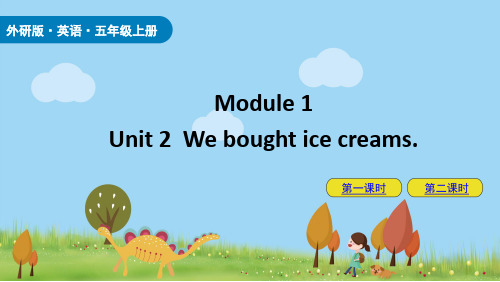
Read and answer.
★Did Lingling go to the park yesterday? Yes, she did. .
★Did she meet John? Yes, she did.
.
★Did they buy ice creams? Yes, they did.
.
★Did they go home by bike? No, they didn't.
S1: Did you watch TV yesterday? S2: Yes, I did. Did you clean your room yesterday? S3: …
Review.
We know Lingling is in London. What happened to her?
Look, listen and say.
二、将下列字母组合成一个单词。
1. o,e,p,n,h ___p_ho_n_e___
2. m,e,i,l,a __e_m_a_i_l _
3. o,p,t,s,r,c,a,d _p_o_st_c_a_r_d_ 4. p,r,d,o __d_ro_p__
三、看图填空。 Did you watch TV yesterday? Did you play football yesterday? Did you send an email yesterday?
Listen and say. Then sing.
There is a song from Lingling’s postcard! Let’s listen!
Watch the video.
Listen and sing with it.
外研版(三起)-英语-五年级上册- Module 8 Unit 2 教材同步讲解 教案(词汇)

Module 8Unit 2 Yesterday I went to Sam and Amy’s schoo1.昨天我去了萨姆和埃米的学校。
Listen and chant.听一听并说唱。
(教材第47页)课文全译Amy’s house is near the schoo1.So she always wants to walk.School starts at nine o’clock.She can play with friends and talk.埃米的房子在学校附近。
所以她总是想要步行。
上课时间在九点钟开始。
她可以与朋友们玩和交谈。
词汇全解必会always /'ɔ:lweiz/ adv.(副词)总是,一直字母组合al在always中发/ɔ:l/,字母组合ay发/ei/。
'al·ways /'ɔ:l·weiz/usually通常,often经常,sometimes有时,never从不She always watches TV in the evening.她总是在晚上看电视。
al+way(道路)+s=always(总是,一直)Listen and read.听一听,读一读。
(教材第47页)情景详解英语描述:This is a letter from Lingling.She tells Daming about her school life in the UK.汉语描述:这是一封来自玲玲的信。
她告诉大明关于她在英国的学校生活。
课文全译15 Marling StreetLondon,NW2UKDear Daming,Yesterday l went to Sam and Amy’s schoo1.In the UK they don’t start school at eight o’clock. They start at nine o’clock. They don’t d o morning exercises here.They all play in the playground.I skipped with the girls.The bell rang at nine o’clock. Then we went into the classroom.Love,Lingling马林街15号伦敦,NW2英国亲爱的大明:昨天我去了萨姆和埃米的学校。
外研版小学(三起)英语五年级上册英语 Module 2 教学课件 Unit 2

I bought some… I/We bought …
美国货币小知识
美国货币由美元dollar和美分cent组成,one dollar 等于100 cents。其纸币bill有一、二、五、十、二十、 五十和一百美元等面值;硬币coin有一美分(或a penny)、五美分(或a nickel)、十美分(或a dime) 和二十五美分(或a quarter)等。在数字前加$表示美 元,如: $500表示五百美元;在数字后加C表示美分, 如:50C表示50美分;表示由美元和美分组成的钱数时, 常用$表示,如: $6.50。
We need a big bag for our picnic.
此句是一个叙述需求的一般现在时态的陈述句, need 在此处做实义动词,意为“需要”,后接名 词,表示需要某物。
句型结构: 主语 + need + 名词/代词 + 其他?
例 I need some sugar for the coffee.
chocolate?
How much juice did she
drink?
Yes, she ate it all.
She drank it all.
Role play. Ms Smart
Amy
Lingling
Listen and read.
Look and guess.
What are they doing?
Do and say.
The two girls went to the supermarket yesterday. Let’s see what they bought.
A: How many/much… did you buy? B: …
外研版小学英语(三起)五年级单词表(上下册-含音标)
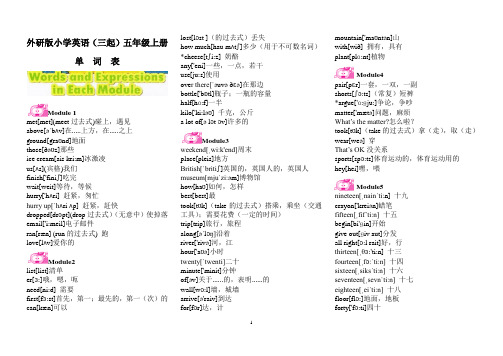
外研版小学英语(三起)五年级上册单词表Module 1met[met](meet过去式)碰上,遇见above[əˈbʌv]在.....上方,在.....之上ground[graʊnd]地面those[ðəʊz]那些ice cream[ais kri:m]冰激凌us[ʌs](宾格)我们finish['finiʃ]吃完wait[weit]等待,等候hurry['hʌri] 赶紧,匆忙hurry up[ˈhʌri ʌp] 赶紧,赶快dropped[drɔpt](drop过去式)(无意中)使掉落email['i:meil]电子邮件ran[ræn] (run的过去式) 跑love[lʌv]爱你的Module2list[list]清单er[ɜ:]哦,嗯,呃need[ni:d] 需要first[fɜ:st]首先,第一;最先的,第一(次)的can[kæn]可以lost[lɔst ](的过去式)丢失how much[hau mʌtʃ]多少(用于不可数名词)*cheese[tʃi:z] 奶酪any['eni]一些,一点,若干use[ju:s]使用ove r there[ˈəuvə ðɛə]在那边bottle['bɒtl]瓶子;一瓶的容量half[hɑ:f]一半kilo['ki:ləʊ] 千克,公斤a lot of[ə lɔt ɔv]许多的Module3weekend[ˌwi:k'end]周末place[pleis]地方British[ˈbritiʃ]英国的,英国人的,英国人museum[mjuˈzi:əm]博物馆how[haʊ]如何,怎样best[best]最took[tʊk](take的过去式)搭乘,乘坐(交通工具);需要花费(一定的时间)trip[trip]旅行,旅程along[əˈlɔŋ]沿着river['rivə]河,江hour['aʊə]小时twenty[ˈtwenti]二十minute['minit]分钟of[əv]关于......的,表明......的wall[wɔ:l]墙,城墙arrive[ə'raiv]到达for[fɔr]达,计mountain['maʊntən]山with[wið] 拥有,具有plant[plɑ:nt]植物Module4pair[pɛr]一套,一双,一副shorts[ʃɔ:ts](常复)短裤*argue['ɑ:ɡju:]争论,争吵matter['mætə]问题,麻烦What’s the matter?怎么啦?took[tʊk](take的过去式)拿(走),取(走)wear[weə] 穿That’s OK没关系sports[spɔ:ts]体育运动的,体育运动用的hey[hei]嘿,喂Module5nineteen[ˌnainˈti:n] 十九crayon['kreiən]蜡笔fifteen[ˌfifˈti:n] 十五begin[bi'ɡin]开始give out[ɡiv aut]分发all right[ɔ:l rait]好,行thirteen[ˌθɜ:'ti:n] 十三fourteen[ˌfɔ:ˈti:n] 十四sixteen[ˌsiksˈti:n]十六seventeen[ˌsevnˈti:n] 十七eighteen[ˌeiˈti:n] 十八floor[flɔ:]地面,地板forty['fɔ:ti]四十number[ˈnʌmbə]数字thirty['θɜ:ti]三十fifty['fifti]五十sixty['siksti]六十seventy[ˈsevnti]七十eighty['eiti]八十ninety['nainti]九十happily[ˈhæpili]幸福地,愉快地many['meni]许多,很多Module6well[wel] 好,熟练地team[ti:m]运动队,球队really[ˈri:əli]很,非常good at[ɡud æt]擅长catch[kætʃ]抓住,接住*goalkeeper[ˈgəʊlki:pə]守门员think[θiŋk]想,认为fantastic[fænˈtæstik]极好的fan[fæn]狂热仰慕者,迷past[pɑ:st]过去swan[swɒn](swim的过去式)游泳slow[sləʊ]慢的healthy[ˈhelθi]健康的Module7a lot[ə lɔt]许多,大量useful[ˈju:sfl]有用的show[ʃəʊ](电视或广播)节目*presenter[priˈzentə](电视或广播节目的)主持人deaf[def]失明的,瞎的dear[diə]失聪的,聋的hear[hiə]听到her[hə](宾格)她fire['faiə]火灾,失火*firefighter[ˈfaiəfaitə]消防队员hot dog[hɔt dɔg]热狗*sausage[ˈsɔsidʒ]香肠kind[kaind]友好的,善意的,体贴的Module8time[taim]时刻,时候,时间school[sku:l]上课时间,上学时间start[stɑ:t]开始,发生past[pɑ:st]晚于,过(几点)late[leit]迟到的go to bed上床睡觉exercise['eksəsaiz] 运动,锻炼playground['pleiɡraʊnd] 操场before[biˈfɔ:] 在……之前join[dェɔin]加入,参加Skipping rope 跳绳coffee[ˈkɔfi]咖啡tea[ti:]茶always['ɔ:lweiz]总是,一直bell[bel]钟,铃rang[ræŋ](ring过去式)鸣,响into['intə]进入......里面Module9feel[fi:l] 感觉,觉得bored 厌烦的,厌倦的sad[sæd] 伤心的,难过的woof[wuf](狗发出的)吠声miss[mis] 想念angry['æŋɡri] 生气的,愤怒的ill[il]有病的,不健康的told[təʊld](tell的过去式)告诉better['betə]痊愈的,恢复健康的farm[fɑ:m] 农场tired['taiəd] 累的,疲劳的won[wʌn](win的过去式)赢,获胜ruler[ˈru:lə]直尺smell[smel]闻出,嗅出Module10kitchen['kitʃin]厨房toilet['tɔilət]厕所,卫生间,room[ru:m]房间living room[ˈliviŋ ru:m]起居室,客厅*hide-and-seek[ˌhaid n ˈsi:k]捉迷藏now[naʊ] 好,哦last[lɑ:st] 最后hide[haid] 躲,躲藏sofa['səʊfə] 沙发shout[ʃaʊt] 呼喊,大叫grass[ɡrɑ:s]草,草地baby['beibi]婴儿dangerous[ˈdeindʒərəs]危险的外研版小学英语(三起)五年级下册单词表Module 1still /stɪl/还,仍然programme /’prəʊgræm/(电视或广播)节目lady /’leidi/女士,夫人life /laɪf/生活different /’dɪfrənt/不同的ago /ə’gəʊ/以前interviewer /,ɪntə’vj u:ə/采访者enough /ɪ’n ʌf/足够的television /,telɪ’vɪʒən/电视机*grandchildren(grandchild的复数形式)(外)孙子(女)/græn’ tʃɪldrən/change /tʃændʒ/改变,变化night /naɪt/夜晚,夜间work /wɜ:k/工作;劳动;干活儿field /f i:ld/田地fire /faɪə/火,炉火or /ɔ: /(用于否定句中)也不,也没radio /’r eɪd ɪəʊ/收音机telephone /’telɪfəʊn/电话couldn`t=could not /kʊndt/不能write /raɪt/写hope /həʊp/希望Module2learnt(learn的过去式)/lɜ:nt/学习taught(teach的过去式)/t ɔ:t/教,讲授language /’læŋgwɪdʒ/语言wrote(write) /rəʊt/写dancer /’dɑ:nsə/舞蹈演员foreign /’fɔ:rɪn/外国的studied(study的过去式) /’stʌdi/学习hard /hɑ:d/努力地Module3hamburger /’hæmbəgə/汉堡English /’ɪŋglɪʃ/英国(式)的breakfast /’brekfəst/早餐,早饭lunch /l ʌntʃ/午餐,午饭sandwich /’sændwɪtʃ/三明治fish and chips/fɪʃtʃɪps/炸鱼加炸薯条traditional /trə’dɪʃənəl/传统的dish /dɪʃ/食品;菜肴very much很,非常gave/geɪv/给(give的过去式)tonight /tə’naɪt/今夜,今晚Module4library /’laɪbrəri/图书馆student /’stjU:dənt/学生sent(send的过去式) /sent/发送,寄*CD激光唱片,光盘idea /aɪ’dɪə/主意,想法put /put/放,安放*shelf / ʃelf/架子heavy /’hevi/重的,沉的dictionary /’dɪk ʃənəri/词典;字典card /kɑ:d/卡片library card图书卡,借书证ask /ɑ:sk/邀请wrong /rɒŋ/错误的dear /dɪə/哎呀information /, ɪnfə’meɪʃən/信息*e-book电子书project /’prɒdʒekt/项目guide /gaɪd/介绍,指南,手册film /f ɪlm/电影as well /æs wel/又,还,也way /weɪ/方法,方式on关于*topic /’tɒpɪk/话题Module5light /laɪt/轻的hard /hɑ:d/困难的,费力的*broken /’brəʊkən/坏的,破的department store /d ɪ’pɑ:tməntstɔ:/百货商店pocket /’pɒkɪt/口袋,兜umbrella / ʌm’brelə/雨伞sales assistant /seɪlz ə’sɪstənt/售货员,营业员wheel /wi:l/轮子easy/ i:zi/容易的,不费力的take /teɪk/选择要,选择购买too /t u:/太,过于try /traɪ/试,尝试lovely /’lʌvli/美丽的,可爱的;令人愉快的Module6moon /m u:n/月亮,月球get /get/到达west /west/西,西部,西方;向西方parent /peərənt/母亲;父亲;家长stay /steɪ/停留play day sayJuly /dʒʊ’laɪ/七月south /saʊθ/南,南部,南方;向南方remember /rɪ’membə/记得June / dʒu:n/六月east / i:st/东,东部,东方;向东方best /best/最好的north /n ɔ:θ/北,北部,北方;向北方rest /rest/ 休息have a rest休息一下rode /rəʊd/骑(ride的过去式)Module7evening / ‘ɪvənɪŋ/傍晚,晚上late/l eɪt/近日暮的;近深夜的;时间不早的worker /’wɜ:kə/工人factory /’f æktəri/制造厂;工厂early /’ ɜ:li/早的taxi /’tæksɪ/出租车,计程车quarter /’kwɔ:tə/一刻钟to /t u:/(距整点)差......worry /’wʌri/焦虑,担心Module8paper /’peɪpə/纸Chinese / tʃaɪ’n i:z/中国人的so /səʊ/如此,这样word /w ɜ:d/词,字drew(draw的过去式) /dr u:/画cut(cut的过去式) /k ʌt/剪,切,割piece /pi:s/张,片,块paint(用颜料)/peɪnt/绘画,着色put(put的过去式) /p ʊ t放,安放stick /stɪk/小木棍,小木条tied(tie的过去式)/taɪd/扎上,系上*string /strɪŋ/线,绳子Module9laugh /lɑ:f/笑wore(wear的过去式) /w ɔ:/穿letter /’letə/信,书信theatre /’θɪətə/剧院women(woman的复数形式)/’wɪmɪn/女性,妇女actor /’æktə/演员told(tell的过去式) /təʊld/口述,讲(故事等)joke / dʒəʊk/笑话after /’ ɑ:ftə/在……以后show(尤指剧院的) / ʃəʊ/演出,表演restaurant /’restərɒnt/饭店,餐馆read(read的过去式) /red/读at all一点都in在(将来一段时间)之后another /ən’ʌðə/另一个history /’hɪstəri/历史ask /ɑ:sk/问,询问question /’kwestʃən/问题forget /fə’get/忘,忘记bring /brɪŋ/带来,拿来soon /s u:n/不久,很快Module10when /wen/在什么时候end /end/结束,终止nervous /’ nɜ:vəs/紧张的,情绪不安的all right没事,没问题airport /’ eəpɔ:t/机场ticket /’tɪkɪt/票passport /’pɑ:spɔ:t/护照safe /seɪf/安全的,平安的pet /pet/宠物speak/spi:k/说,讲building /’bɪldɪŋ/建筑物American/ ə’merɪkən/美国的;美国人的;美国人find out /faɪnd aʊt/发现,弄清more /mɔ:/更多的(量),较多的(量)。
外研版三起点五年级英语上册Module1Unit2、We、bought、ice、creams教案7

Module1 Unit2教案【内容来源】外研版三起点(2012年审定)五上Module1 Unit2【主题】We bought ice creams.【课时】此教学设计按单元写,教师可根据实际情况划分课时。
一、教学目标(Teaching aims)(1)1. 能够听、说、认、读单词phone, send, bought.(2)能够听、说、读、写单词email, ran, love.(3)会使用句型Did he/she …? 对他人进行询问,并能做出相应的回答Yes, he/she did. / No, he/she didn’t.二、教学重难点(Teaching points and difficulties)(一)重点(Points)听、说、读、写单词email, ran, love.(二)难点(Difficulties)过去时的一般疑问句的回答中主语人称的变化。
三、教学准备(Teaching preparation)多媒体PPT课件。
教学过程采用任务型教学法、情景教学法、交际法。
四、教学过程Step 1: Warm-up1. Greetings. (师生间简单地打招呼。
)T: Hello, boys and girls. Glad to see you!Ss: Me, too.T: Were you happy last weekend?Ss: Yes.T: L et’s talk about what you did last weekend, OK?Ss: OK. (请同学们谈谈自己的周末)2. Listen and say. Then chant.T: Last weekend I went to see the London Eye.Do you know the London Eye?教师利用课件呈现伦敦眼的图片。
T: Is it beautiful?Ss: Yes.T:Now let’s sing the song.教师先请学生观看动画欣赏歌曲,后看歌词,跟着录音唱歌曲。
外研版小学英语五年级上册三起全册教案
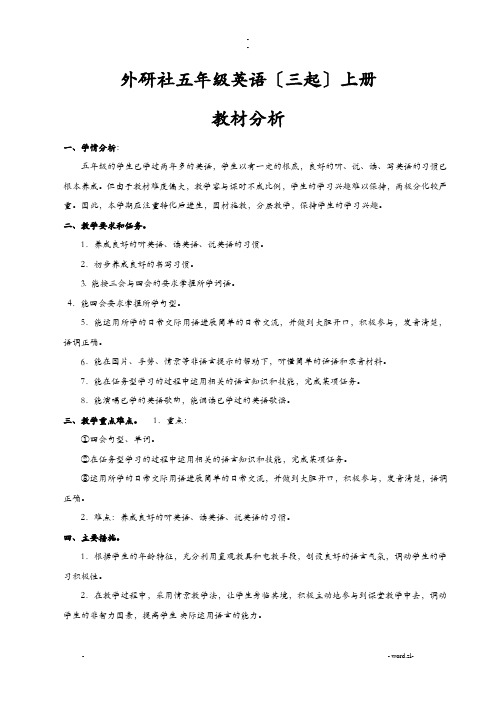
外研社五年级英语〔三起〕上册教材分析一、学情分析:五年级的学生已学过两年多的英语,学生以有一定的根底,良好的听、说、读、写英语的习惯已根本养成。
但由于教材难度偏大,教学容与课时不成比例,学生的学习兴趣难以保持,两极分化较严重。
因此,本学期应注重转化后进生,因材施教,分层教学,保持学生的学习兴趣。
二、教学要求和任务。
1.养成良好的听英语、读英语、说英语的习惯。
2.初步养成良好的书写习惯。
3. 能按三会与四会的要求掌握所学词语。
4.能四会要求掌握所学句型。
5.能运用所学的日常交际用语进展简单的日常交流,并做到大胆开口,积极参与,发音清楚,语调正确。
6.能在图片、手势、情景等非语言提示的帮助下,听懂简单的话语和录音材料。
7.能在任务型学习的过程中运用相关的语言知识和技能,完成某项任务。
8.能演唱已学的英语歌曲,能诵读已学过的英语歌谣。
三、教学重点难点。
1.重点:①四会句型、单词。
②在任务型学习的过程中运用相关的语言知识和技能,完成某项任务。
③运用所学的日常交际用语进展简单的日常交流,并做到大胆开口,积极参与,发音清楚,语调正确。
2.难点:养成良好的听英语、读英语、说英语的习惯。
四、主要措施。
1.根据学生的年龄特征,充分利用直观教具和电教手段,创设良好的语言气氛,调动学生的学习积极性。
2.在教学过程中,采用情景教学法,让学生身临其境,积极主动地参与到课堂教学中去,调动学生的非智力因素,提高学生实际运用语言的能力。
3.活用教材,根据学生会的实际情况,将每单元各个板块重现组排降低难度。
Module 1 Unit 2 We bought ice creams.教学设计Module 2 Unit 1 What did you buy?教学设计Module 2 Unit 2How much cheese do you buy?教学设计Module 3Unit 1 Where did you go?教学设计Module 3 Unit 2 Daming took a photo of his father.教学设计Module 4 Unit1 Mum bought a new T-shirt for me.教学设计Module 4Unit2 What`s the matter with Daming?教学设计Module5Unit 1 There are only nineteen crayons.教学设计Module 5Unit2 There are forty.教学设计Module6 Unit1 You can play football well.教学设计Module 6Unit2 He ran very fast.教学设计Module7Unit1 He can’t see.教学设计Module7 Unit2 The little girl can`t walk.教学设计Module 8Unit 1 What time does your school start?教学设计M8U 2 YesterdayI went to Sam and Amy`s school.教学设计Module 9Unit 1 Are you feeling bored ?教学设计Module9 Unit2I feel happy.教学设计Module 10Unit 1 He was in the kitchen.教学设计Module10 Unit2 Don`t shout please!教学设计。
[全]外研版(三起)小学英语五年级上册知识点归纳总结
![[全]外研版(三起)小学英语五年级上册知识点归纳总结](https://img.taocdn.com/s3/m/ce559d8e376baf1ffd4fad4a.png)
外研版(三起)小学英语五年级上册知识点归纳总结Module 1一、音标e——/iː/ Chinese, these,ea——/iː/ ear, please, teacheri——/ɪ/ it, listen, ill, sit, give, pig, bige——/e/ tell, then, pen, desk, pencil, net,a——/æ/ cat, apple, hat, bag, many, lap, value二、词汇met (meet的过去式) 碰上,遇见wait 等待,等候dropped (drop的过去式)(无意中)使掉落finish 吃完,喝完,用尽ran (run的过去式) 跑send 发送,寄ground(地面)ice cream(冰淇淋)email(电子邮件)above(在......上方,在......之上)those(那些)us(宾格)(我们)love(爱你的)三、固定搭配come back 回来hurry up 赶紧,赶快live in 住在go to the park 去公园go home 回家by bus 乘公共汽车wait for 等待last Sunday 上星期日四、句子1. How are you? 你好吗?2. I’m fine, thank you.我很好,谢谢你。
3. Come with us.跟我一起来吧。
4. Wait for me! 等等我!5. Thank you!谢谢你!五、重点句型1. 询问对方过去是否做过某事:Did you + 动词原形+ 其他?用Yes, I / we did.或者No, I / we didn’t.来回答。
eg:Did you go to school yesterday?你昨天上学了吗?Yes, I did.是的,昨天我上学了。
Did you see a film last night?你昨晚看电影了吗?No, we didn’t.不,我没看。
外研版三起点五年级上册英语第二模块单词
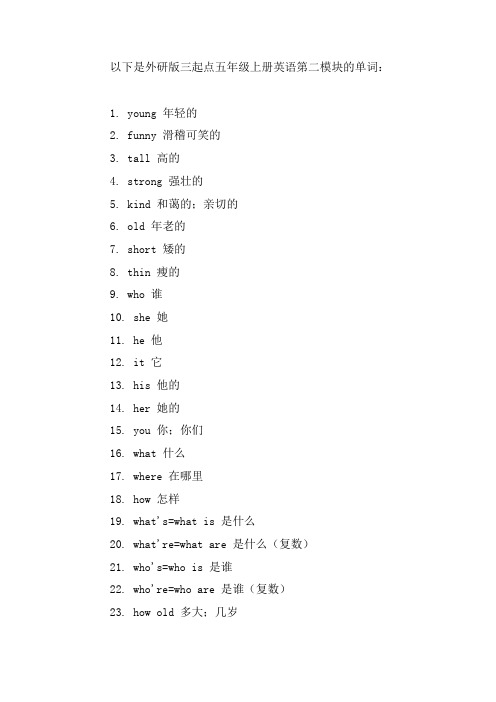
以下是外研版三起点五年级上册英语第二模块的单词:
1. young 年轻的
2. funny 滑稽可笑的
3. tall 高的
4. strong 强壮的
5. kind 和蔼的;亲切的
6. old 年老的
7. short 矮的
8. thin 瘦的
9. who 谁
10. she 她
11. he 他
12. it 它
13. his 他的
14. her 她的
15. you 你;你们
16. what 什么
17. where 在哪里
18. how 怎样
19. what's=what is 是什么
20. what're=what are 是什么(复数)
21. who's=who is 是谁
22. who're=who are 是谁(复数)
23. how old 多大;几岁
24. how many 多少个(可数名词复数)
25. how much 多少(用来询问价格,或不可数名词的数量)
26. happy 高兴的;幸福的
27. birthday 生日
28. hungry 饥饿的
29. thirsty 口渴的
30. thanks 谢谢;感谢
31. here 这里;在这里
32. there 那里;在那里
33. big 大的
34. small 小的
35. long 长的
36. short 短的
37. tall 高大的
38. short 矮的
39. fat 胖的
40. thin 瘦的。
外研版(三年级起点)五年级上册重点知识点复习精选全文

可编辑修改精选全文完整版五年级上册重点知识点复习Module 1Unit 1 Did you come back yesterday ? 昨天你回来了吗?Unit 2 We bought ice cream. 我们买了冰淇淋。
一、重点短语1. in London 在伦敦2. be back from 从……回来3. come back 回来4. last Sunday 上星期天5. live in住在6. look at 看7. let’s = let us让我们 8. ice cream 冰激凌9. come with 与……一起来 10. go home 回家11. hurry up 赶快 12. wait for 等待13. by bus 乘坐公交车 14. Chinese friends 中国朋友15. send an email 发送电子邮件二、重点句子1. When did you come back? 你们什么时候回来的?2. We came back last Sunday.我们上星期天回来的。
3. Did they buy ice creams? 他们买冰淇淋了吗?4. Do you live in London, too? 你也住在伦敦吗?5. Hurry up! 赶快!6. Wait for us! 等我们!7. I dropped my ice cream.我把冰淇淋弄掉了。
三、重点句型:1. 疑问词(放在句首)when什么时候 where在哪里 who谁 what什么 how怎样,如何2. 一般疑问句用什么提问,用什么回答(疑问句直接回答)(1). Did you walk to school? (你步行去学校么?)Yes, I did. No, I didn’t(2). Did they go home by bike?(他们骑自行车去学校么?)Yes, they did. No, they didn’t.(3). When did you come back with Sam?(你和Sam什么时候回来?)(4). I came back with Sam yesterday.(我和Sam昨天回来的。
外研版英语五年级上册M1unit2

Lingling ran to the bus. And she dropped her ice cream.
Retterday
go home
when
who
a postcard
Lingling, Sam and Amy
what
where park
met
[ i:]
Look, listen and say
Did she send you an email?
No, She didn’t.
Here’s a postcard from Lingling. It’s for you.
bought
go home
when who
a postcard
what
where
yesterday Lingling, Sam and Amy
Listen and repeat
[Ι]
[e]
[æ ]
Chinese teacher
e ea [ i:]
listen give
i [Ι]
tell
e
[e]
then
cat apple
a [æ ]
Follow and say What did you do yesterday?
Yesterday I bought an ice cream. Yesterday Xiaohai bought an ice cream and I watched TV.
ice creams. Then we went home by bus. I ran to the bus.
And I dropped my ice cream on John’s shoes.
外研版三起英语五年级上册:全册教案【精品】
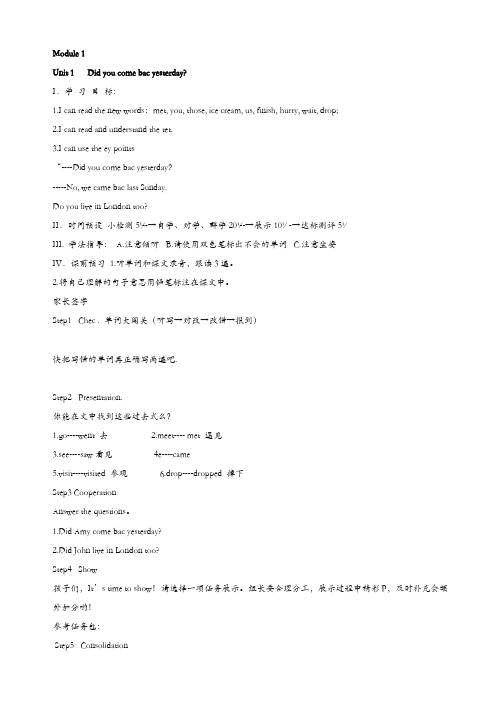
Module 1Unit 1 Did you come bac yesterday?I.学习目标:1.I can read the new words:met, you, those, ice cream, us, finish, hurry, wait, drop;2.I can read and understand the tet.3.I can use the ey points“----Did you come bac yesterday?-----No, we came bac last Sunday.Do you live in London too?II.时间预设小检测5¹--→自学、对学、群学20¹--→展示10¹-→达标测评5¹III. 学法指导:A.注意倾听 B.请使用双色笔标出不会的单词 C.注意坐姿IV.课前预习1.听单词和课文录音,跟读3遍。
2.将自己理解的句子意思用铅笔标注在课文中。
家长签字Step1 Chec . 单词大闯关(听写→对改→改错→报到)快把写错的单词再正确写两遍吧.Step2 Presentation.你能在文中找到这些过去式么?1.go----went 去2.meet---- met 遇见3.see----saw看见4e----came5.visit----visited 参观6.drop----dropped 掉下Step3 CooperationAnswer the questions。
1.Did Amy come bac yesterday?2.Did John live in London too?Step4 Show孩子们,It’s time to show!请选择一项任务展示。
组长要合理分工,展示过程中精彩P,及时补充会额外加分哟!参考任务包:Step5 ConsolidationI.翻译短语。
1.hurry up2.go home____________3e bac 4.ice cream____________5.wait for6.live in ____________II.小小翻译家。
- 1、下载文档前请自行甄别文档内容的完整性,平台不提供额外的编辑、内容补充、找答案等附加服务。
- 2、"仅部分预览"的文档,不可在线预览部分如存在完整性等问题,可反馈申请退款(可完整预览的文档不适用该条件!)。
- 3、如文档侵犯您的权益,请联系客服反馈,我们会尽快为您处理(人工客服工作时间:9:00-18:30)。
Module 8
Unit 2 Yesterday I went to Sam and Amy’s school.
教材简析:
本课时为五年级上册《Module 8 Unit 2 Where did Lingling go yesterday?》内容,主要教学内容为如何使用正确的语态来书写信件、学习辅音字母的音标的发音及歌谣的吟唱。
为此,我设计了这堂课,通过信件、游戏等形式,使学生在快乐学习中综合学习学过的有关于时间表达方面的内容,使得这些零散的知识得以综合运用。
学情分析:
五年级英语在小学英语教学中起着承上启下的作用,既是四年级的衍生又是六年级的铺垫。
我们的学生虽然已有两年的英语学习经验,但还有以下一些问题需要解决。
部分学生学习的目的性不是很强,导致学习习惯不好,学习无明确的计划,有作业就写,无作业就玩。
老师布置的作业不能按时完成。
作为语言性学科,听与读是非常关键的环节,而大多数学生这一点做的不好,这在听力测试时表现的尤为明显。
针对以上所存在的问题,改进课堂教学方式,让师生之间的课堂活动形式更加多样化,师生之间更加融洽;重新调整对学生的评价模式,让他们更好发挥自身潜能,规范学习态度,严谨学习作风;加强与学生家长的交流,更好发挥家校共建作用;与问题学生多谈心,多交流,帮助他们想办法,解决学习上存在的问题,让他们看到努力之后的结果。
设计理念:
以小学英语新课程标准为理论依据,参照小学生心理及生理特点而设计,采用视听法、全身反应法、表演法以及任务型教学等方法。
教学目标:
1.学习目标语句:Where did Lingling go yesterday? Yesterday I went to Sam and Amy’s school. 单词:bell, rang
2.2.能口头运用Where did Lingling go yesterday? 这类语句询问过去发生的事情,并能运用Yesterday I went to Sam and Amy’s school. 这类语句回答。
3.培养学生开口说英语,认真听课的好习惯。
培养学生热爱自己的学校的情感。
教学重点:能口头运用Where did Lingling go yesterday? 这类语句询问过去发生的事情
4.教学重点、难点:
s, c, z, th, sh, r, h 的发音及其对应的字母和字母组合
教学用具:
挂图、单词卡片、录音机、磁带、空表格等。
课时安排:一课时
教学方法:
课内教学方面:
1、体现兴趣第一的思想。
唱唱英文歌曲是课堂前的“家常便饭”。
游戏设计便是我在课堂上为学生精心烹调的“风味大餐”。
以平等、互助、合作式的伙伴关系蹲下来和小学生参与游戏,学生更爱玩更爱学。
2、激励肯定评价,使之感受成功的喜悦。
3、重视合作,“比、学、赶、帮”,体验集体荣誉感。
4、模拟语言情境,再现真实生活乐趣。
课外教学方面(练习):
1、“小手拉大手,听、读、教”三合一。
2、课外练习,延伸课堂教学。
教学过程:
一、热身复习
1、播放录音《I GET UP IN THE MORNING》,学生边听边吟唱。
2、播放活动一的录音,同时让学生边读边记,采取“一分钟记忆”去背诵句子。
【设计意图】感受中外的文化的差异,培养学生文化策略意识。
二、任务呈现与课文导入
教师问:我们已经知道了中英学校之间的不同,下面我们来讲一讲生活的不同。
教师询问学生每天的生活情况,与较好的学生进行下面的问答:
Can I ask you some questions?
What time do you get up?
How do you go to school?
What do you do after school?
What time do you go to bed?
What do you do at the weekend?
将上面的问题重复说出,请学生回答,将问题写在黑板上,教师说出,学生重复。
【设计意图】让学生在真实的情景中学习,有利于学生的意义理解和提高学生知识的迁
移能力,培养学生说英语的能力和习惯。
三、课文教学
(一)、学习新词
教师出示卡片教授bell.让学生多读,然后分组读。
教师故意把手机调到闹铃上,让手机闹铃响。
教授单词:ring,进而教授其过去式rang。
(二)Unit2 活动2
1、(出示挂图)学生自由读Unit2 Part 2,完成下面练习题。
同时向学生介绍中国小学和英国小学的不同。
Listen and choose.
()1. When did Lingling go to Sam and Amy’s school?
A.Yesterday.
B. Last Sunday.
()2. Where do they play?
A. In the classroom.
B. In the playground.
()3.Where did Lingling go yesterday?
A. Sam and Amy’s school.
B. Amy’s school.
()4.What time do they start school in England?
A. At 8 o’clock.
B. At 9 o’clock.
()5. What do they do in the playground?
A.They do morning exercises.
B. They all play.
2、播放第一遍录音,学生整体感知;放第二遍录音,学生找出What do they do in the playground? What time do they start school?What did they do there?问题和答案;放第三遍录音,采用一句一停的方法,学生跟读,模仿录音中的语音语调。
(三)Unit2 活动3 让学生根据短文内容独立完成本部分练习,再核对答案。
【设计意图】通过听课文录音,感知课文,理解句型的运用情境。
并学习正确的语音语调。
(四)、活动六任务完成
教师发给每个学生一张调查表,要求学生对班级中至少一人进行采访。
学生离开座位进行自由问答,教师深入到学生中间及时发现问题,给予更正和帮助。
结束调查,学生们回到自己的座位。
教师请几个人汇报自己的调查情况。
【设计意图】通过调查表让学生再深一层的了解中国与英国文化的差异。
五、课文教学
⑴语音教学活动4。
在黑板上写出单词sun 和rice,教师读,并在字母“s”和“c”下面划线。
教师再读单词,启发学生发现他们的特点:字母不同,读音相同。
用同样方法教zoo,nose;Theatre,mouth,this,mother.让学生总结出各组单词中读音相同的部分。
学生打开书本,听第一遍录音;第二次播放录音,在每组单词后停顿,让学生跟读。
【设计意图】通过听录音,感知字母的发音,并学习正确的语音语调。
⑵歌曲教学:介绍活动5歌曲的内容,帮助学生理解其意思。
让学生打开书,看图片,帮助学生理解歌曲的意思。
读歌词,让学生重复。
放录音,学生听。
【设计意图】学习诗歌,感受诗歌,朗读诗歌,让学生体会英语的别样魅力,多方面感受英语知识,让学生对英语更感兴趣。
六、作业:
(一)翻译下列短语
(1)Sam and Amy’s school____萨姆和埃米的学校_________
(2) in England ___在英国__ (3) start school __开始上课_____
(4)do morning exercises _____做早操____
(5)in the playground ____在操场上_______
(6) go into the classroom _____走进教室_______
(二)结合实际谈谈自己学校的一些情况。
板书设计:
Module 8 School Unit 2
Yesterday I went to Sam and Amy’s school.
What time do they start school in England?
What do they do in the playground?
What did Lingling do with the girls?
教学反思:
1、面向全体学生,创造各种情景,鼓励学生大胆地使用英语,进而提高听说读写的综合能力,为学生全面发展和终身发展奠定基础。
2、加强对学生的学习策略的指导,让他们在学习和适用的过程中逐步学会如何自主学
习。
遗憾的是在本节课上,由于复习的内容安排的比较多,导致部分基础差的学生一开始注意力就分散。
3、我在课堂上比较少使用过渡语,个别学生经常不知道下一步要做什么,为什么要进行下一步内容。
所以,学生在每个环节前参与的积极性不高。
4、值得欣慰的是学生在语音部分掌握的比较好,基础较好的学生能正确的理解课文并能仿写作文完成课后作业。
